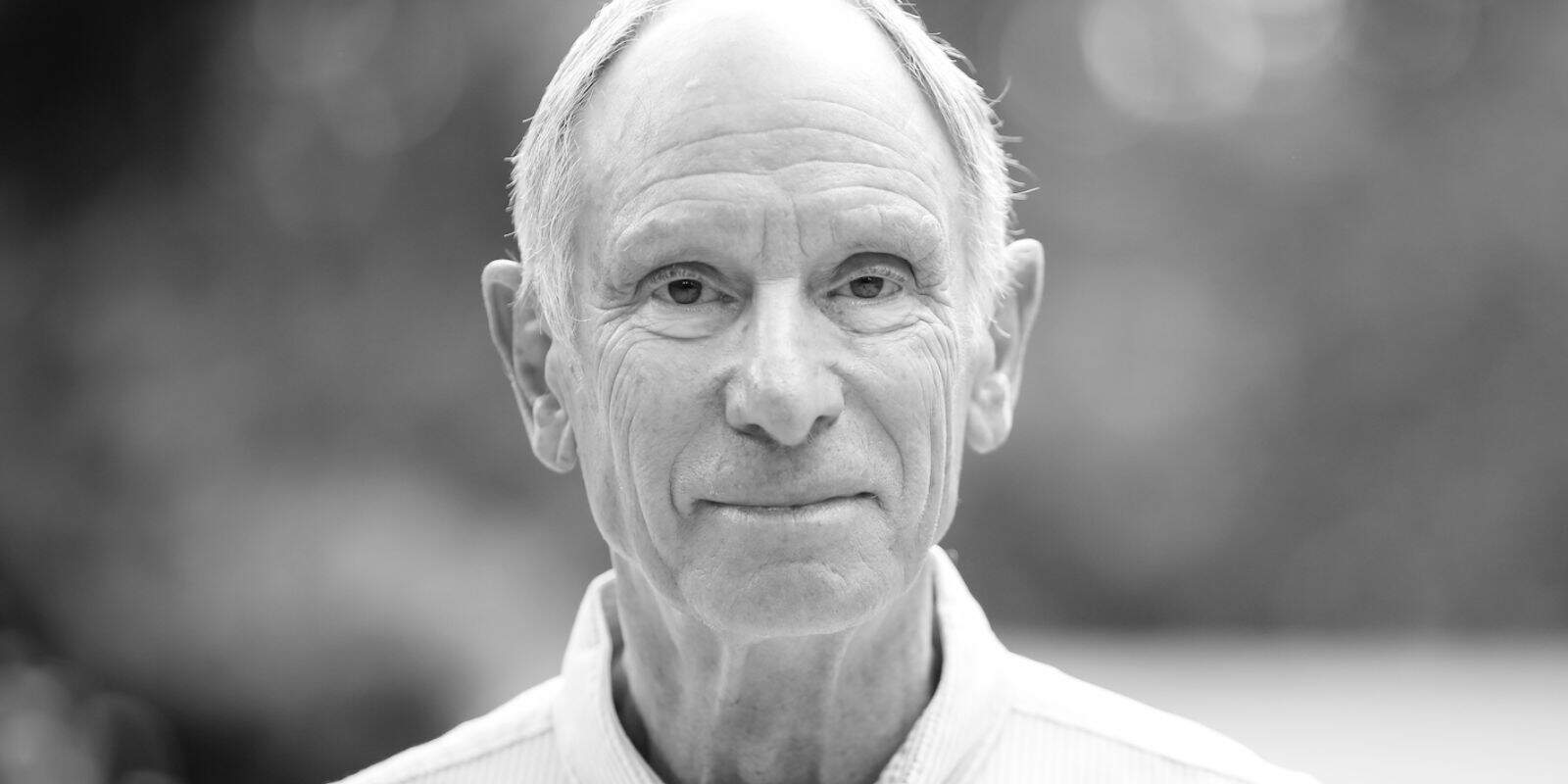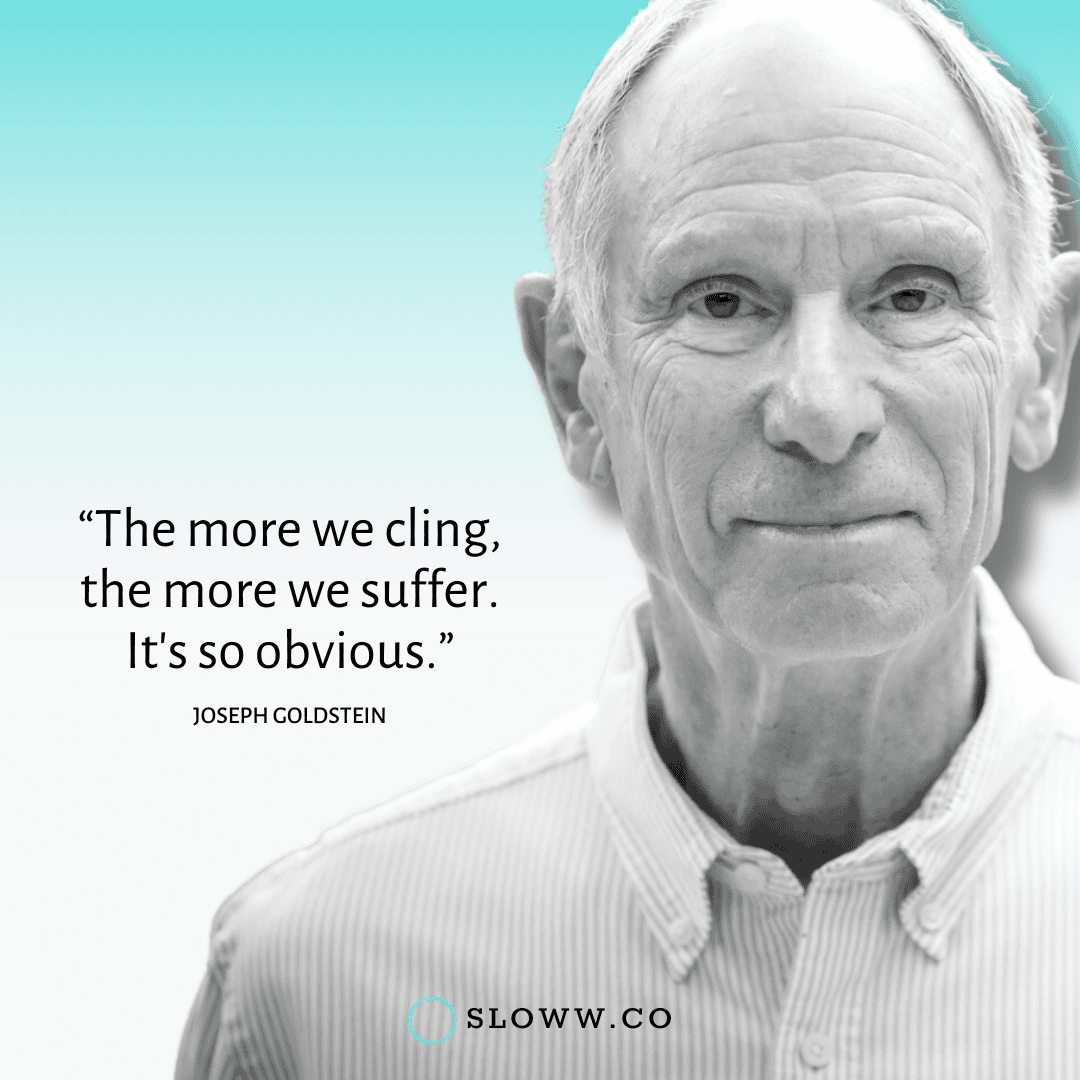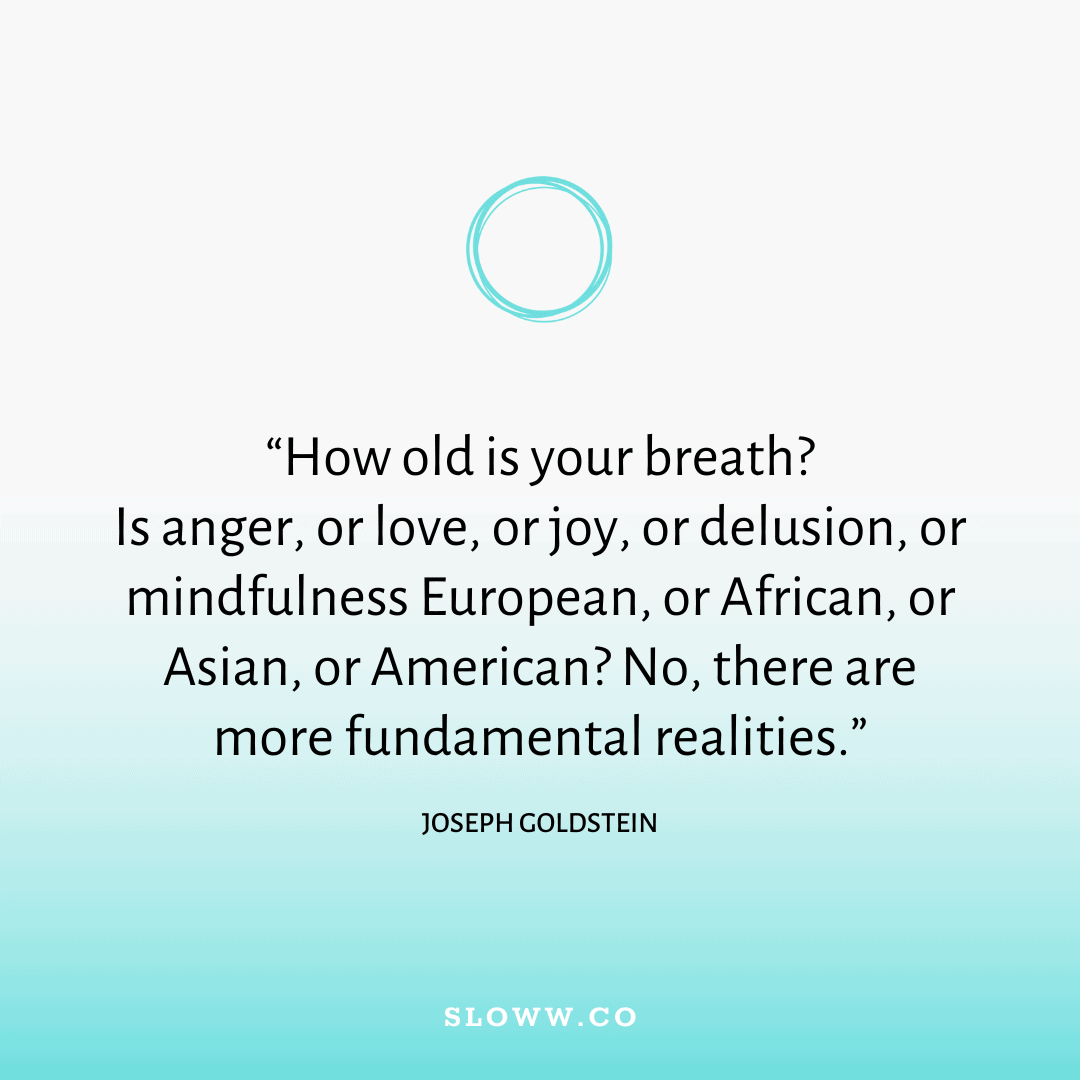This page lists some of the all-time best Joseph Goldstein quotes. Enjoy!
Page Contents:
- Mind & Thinking Quotes
- Self & Selflessness Quotes
- Mindfulness Quotes
- Observation Quotes
- Peace & Happiness Quotes

50+ Joseph Goldstein Quotes on Peace, Mindfulness, Selflessness, & More
Joseph Goldstein Quotes on Mind & Thinking
“How old is your breath? Is anger, or love, or joy, or delusion, or mindfulness European, or African, or Asian, or American? No, there are more fundamental realities.” — Joseph Goldstein
“The thinking/thought process—which engages a huge part of our lives—when unnoticed runs our lives, and when noticed we see that there’s not much there at all.” — Joseph Goldstein
“If we have really seen clearly into the essentially empty nature of thought, then as the different content presents itself, there’s much more space to exercise some wise discernment—is this thought worth following or not worth following? We’re not so identified with them—we’re not so locked in, we’re not so imprisoned by the thoughts in the mind.” — Joseph Goldstein
“What happens when we cling to something which in its very nature will change? The more we cling, the more we suffer. It’s so obvious.” — Joseph Goldstein
“To the degree that we can be with experience without grasping, then we live with ease.” — Joseph Goldstein
“What is frequently arising in the mind becomes the inclination of the mind.” — Joseph Goldstein
“There is a way to look into the mind as well as looking out through it.” — Joseph Goldstein
Joseph Goldstein Quotes on Self & Selflessness
“Realizing selflessness is the great liberating jewel of the Buddhist teachings.” — Joseph Goldstein
“We all are conditioned in certain ways which are quite consistent—which are just the habit patterns of our lives … There’s no one behind the consistent pattern to whom it’s happening. What we call ‘self’ is the consistent pattern … As we look more carefully at the pattern which is consistent, we see that there’s no underlying substratum which is carried along somehow or to which it belongs—that we are the flow of changing experience.” — Joseph Goldstein
“The deepest conditioning and habit of mind—and the root cause of so much suffering in the world—is the attachment we have to the concept of self, to this mental fabrication. The idea, and often it is a felt sense, that there is someone behind experience to whom it’s all happening. We create a reference point for all of our experience, and then we call that reference point ‘self’ or ‘I.'” — Joseph Goldstein
“We begin to see that the self is a concept—it’s a mental construct, it’s a fabrication of our minds … If we understand on a deeper level that the self is a concept, then there’s a lot more fluidity in our lives. We’re no longer in a prison of self-image, of self-concept, and there’s a lot more creativity and a lot more ease.” — Joseph Goldstein
“In understanding selflessness, it’s not that there is something there that we get rid of—what the Buddha is saying is that the notion of self from the very beginning is a concept, an idea. So, in understanding selflessness, we’re simply freeing ourselves from the prison of that particular concept.” — Joseph Goldstein
“The doorway into a deeper understanding of the dharma is through the direct perception of change—that everything has the nature to change, everything that arises will pass away. The more we see that, the less we cling. The less we cling, we begin to see with greater clarity the selfless nature of this whole process. And, this is the whole path of awakening—of waking up from delusion, waking up from ignorance.” — Joseph Goldstein
“Nothing changes. Everything is exactly as it always was except that we’re seeing it and understanding it more clearly. And, in that clarity, there’s less attachment to the notion of self even though we still use it conventionally. We’re not so attached to it, and in being less attached to it, there’s less clinging and less grasping at all of the changing phenomena that we’re calling ‘self’. And, the less clinging and grasping there is, the less we suffer. So, happiness is available.” — Joseph Goldstein
“As our mindfulness and awareness of the mind-body process grows more stable and more precise, we find what we think of the self is not what we thought it to be.” — Joseph Goldstein
“The more carefully we pay attention, our mind begins to open to the rapidity of change of phenomena, and our sense of ourselves becomes much less solid, much less fixed.” — Joseph Goldstein

Joseph Goldstein Quotes on Mindfulness
“We need to train ourselves how to look inward—this is the whole teaching on mindfulness … Mindfulness is sitting—or standing, or in any posture—and simply being aware of what’s arising, and then seeing what we learn from being aware.” — Joseph Goldstein
“If past and future really exist, where are they? … It’s living in the moment—not being so lost in the past, not being so lost in the future. But, this is actually not quite enough. Mindfulness means something more than just living in the moment … Mindfulness has to mean something more than just being in the present.” — Joseph Goldstein
“We need to be living in the present, but it’s more than living in the present. We need to be cultivating the observing power of the mind in order to investigate all of the aspects of our experience, but mindfulness is more than just the observing power.” — Joseph Goldstein
“Mindfulness is living in the present, but it’s more than living in the present. It is the observing power in the mind, but it’s more than the observing power in the mind. It’s observing with skillful attitude in the mind. It’s observing without the filter of greed, of wanting, of aversion, of delusion—and checking the attitude in the mind so that when those are present we actually know they’re present and become mindful of them.” — Joseph Goldstein
“Mindfulness means the observing power of the mind, but the mind that is free of desire, and aversion, and delusion. Mindfulness means we’re seeing, we’re with experience, free of those filters.” — Joseph Goldstein
“One of the meanings of mindfulness is to remember—or to call to mind—what is skillful and what is not skillful, what is wholesome and what is not wholesome, what leads to peace and what leads to suffering … Mindfulness is always a wholesome state of mind and always skillful—which means that that in a moment of mindfulness the mind is free of greed, it’s free of wanting, it’s free of aversion, it’s free of delusion.” — Joseph Goldstein
“Through mindfulness, we begin to see that within ourselves we actually all have an inner remote and we can change channels if we’re mindful enough to see what channel is playing in the mind.” — Joseph Goldstein
“In that space of mindfulness, then there is a possibility of some wise reflection, there’s possibility of a wiser choice. Mindfulness actually creates a space in the mind before action takes place.” — Joseph Goldstein
Joseph Goldstein Quotes on Observation
“What’s really an important step in the meditative process is when we go from the level of concept to the level of direct experience … Don’t believe it. It’s just all suggestions for investigation so that we really see and learn for ourselves.” — Joseph Goldstein
“Our whole life—what we call ‘life’—is a flow of momentary experience. We can understand that intellectually, but the transformative power of it is when we’re really seeing it … The real transformation of our minds and the deepening of wisdom is when we are seeing the changing nature directly in our experience.” — Joseph Goldstein
“If you want to understand the mind, sit down and observe it … When we are observing this mind-body process … this illusion of solidity begins to break up.” — Joseph Goldstein
“Our usual relationship to thought has almost always to do with its content … When we’re observing thinking, we can drop down a level and really look into the very nature of thought itself.” — Joseph Goldstein
“It’s much better to see it than not see it. And, in seeing of it, we no longer need to get caught or so identified with it. But, we need to see it. We need to open to all the parts of ourselves.” — Joseph Goldstein
“It’s not simply being here, it’s knowing that we’re here … It’s seeing, it’s experiencing, the difference between being lost in a thought and being aware that we’re thinking.” — Joseph Goldstein
“It is living in the present, but what we need in addition is a certain observing power of the mind—so that as we know what’s happening, we know that we’re knowing … The observing power of mind knows that we’re knowing … Through this observing power of the mind, we can really start investigating different aspects of reality.” — Joseph Goldstein
“Unless we’re paying attention to our minds as we’re going through our lives, we simply will be acting out and strengthening all the habit patterns of our conditioning.” — Joseph Goldstein
“The important challenge is to be willing to look and to be honest about what’s there.” — Joseph Goldstein
Joseph Goldstein Quotes on Peace & Happiness
“We come to what the Buddha called the ‘highest happiness’ which is peace.” — Joseph Goldstein
“When we actually are beginning to pay attention to the well-established habit patterns in the mind, we see for ourselves this does not make me happy, this does not make me peaceful. Can I reorient to something that does?” — Joseph Goldstein
“We realize that our own happiness depends on awareness … In any moment, we’re either aware of what’s happening or we’re unaware.” — Joseph Goldstein
“What we’re really doing is training in happiness; it’s not a matter of following commandments. We see what factors bring about happiness—these are called ‘wholesome’—and we cultivate them. We see those which bring about suffering, and we learn to let them go.” — Joseph Goldstein
“The Buddha talked about the three wholesome roots of all the actions that bring happiness: non-greed or generosity, non-hatred or love, and non-delusion or wisdom. The three roots of action that bring suffering are exactly the opposite: greed, hatred, delusion.” — Joseph Goldstein
“The law or the truth of karma means that our actions—whether the actions are of our body, or speech, or our mind—bring results.” — Joseph Goldstein
“The point of reference for discerning whether something is skillful or unskillful is quite subtle—the point of reference is the motivation behind the action.” — Joseph Goldstein
“What we do—how we act, the way we speak—has an effect not only on other people but on our own minds. We are creating, moment to moment, our own inner mental environment, and this is the environment we inhabit in our lives.” — Joseph Goldstein
You May Also Enjoy:
- Browse all Quote Posts





